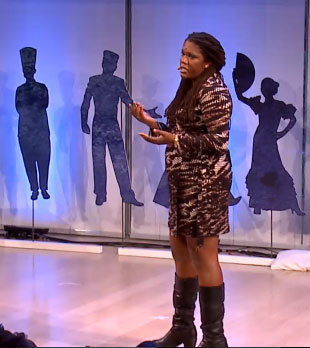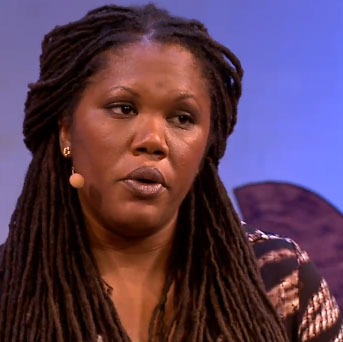 In The Fray contributing writer Joshunda Sanders recently spoke at TEDCity2.0, a conference focused on the challenges and innovations that cities across the world are experiencing today. Joshunda gave a moving talk about her mother’s struggle with mental illness (a story she also told for our blog), and the ways that cities can help, and hinder, the lives of the mentally ill — particularly those who are poor and homeless.
In The Fray contributing writer Joshunda Sanders recently spoke at TEDCity2.0, a conference focused on the challenges and innovations that cities across the world are experiencing today. Joshunda gave a moving talk about her mother’s struggle with mental illness (a story she also told for our blog), and the ways that cities can help, and hinder, the lives of the mentally ill — particularly those who are poor and homeless.
Joshunda’s mother resisted therapy and medication for her bipolar disorder, internalizing society’s view (especially prevalent within the African American community) that mental illness is a personal weakness. In her relationship with Joshunda, she veered between euphoria and depression, loving attention and violent abuse. The family ended up homeless because of her untreated condition, and Joshunda’s childhood was marked by evictions, stays in homeless shelters, and a perpetual hunger. Fortunately, their hometown of New York was generally benevolent in its benefits and its attitude toward the homeless — providing Joshunda with free breakfast in the summers when school was out (often her only meal of the day) and free transportation to and from shelters — even though it never really met their needs for food and housing in such an expensive city.
There are compelling reasons, Joshunda adds, that so many homeless individuals congregate in cities:
After my brother Jose got killed by a bus, my mother moved to the suburbs. So we lived in Chester for the first few years of my life. Chester is outside of Philadelphia. Most families there, in the suburbs — which are considered the heart of the American Dream — had cars, but because we couldn’t afford a car, we had to rely on public transportation. Often, without carfare to get into the core of the city, we would end up languishing in the isolation of the suburbs, and it was a little bit nightmarish. Sometimes the lights would be off, or the water would be off.
And one of the things people forget is the surprising truth about the visibility of the mentally ill in cities … there are real resources for them there. It’s not just the density and public transportation, but there is also this equal-opportunity solace from the cultural vibrancy of a city. So I urge you to think about that the next time you see someone who is mentally ill in the city. Before you think of them as a problem, consider how both they, and we, are transformed by our witness of them in the city. Think of me and my mom, just two fragile souls trying to make it through the city, with what little that we had.
Here is the video of Joshunda’s talk, which begins at the 49:09 mark:
Victor Tan Chen Victor Tan Chen is In The Fray's editor in chief and the author of Cut Loose: Jobless and Hopeless in an Unfair Economy. Site: victortanchen.com | Facebook | Twitter: @victortanchen
- Follow us on Twitter: @inthefray
- Comment on stories or like us on Facebook
- Subscribe to our free email newsletter
- Send us your writing, photography, or artwork
- Republish our Creative Commons-licensed content

